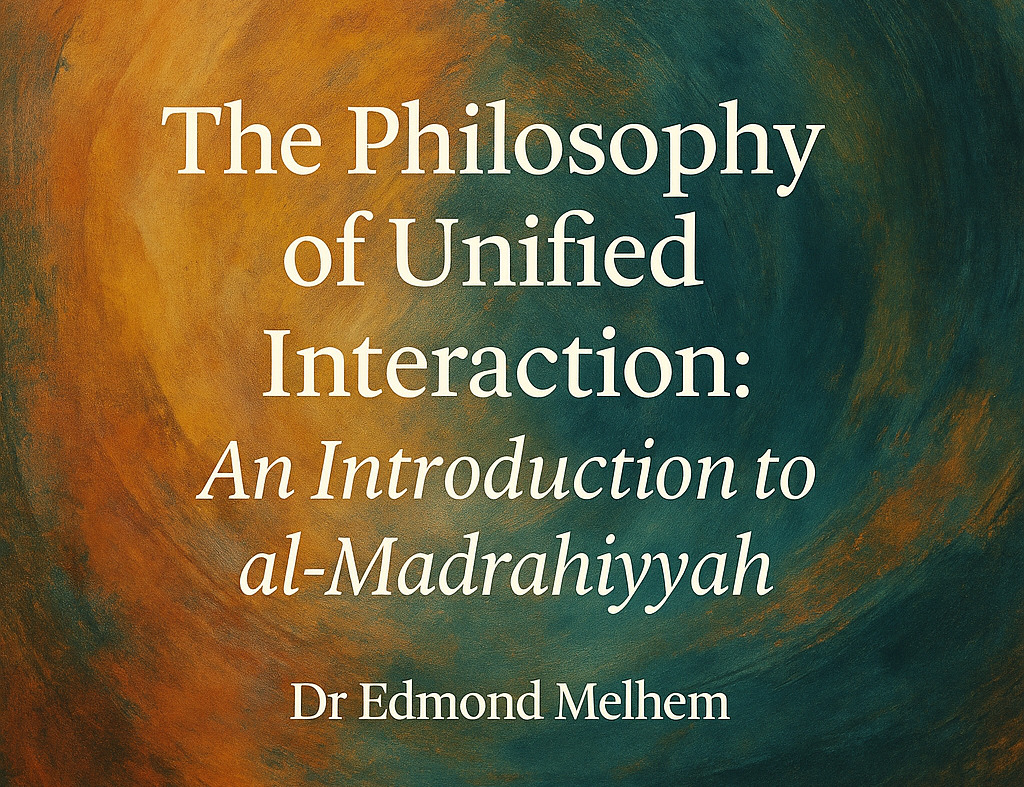An introduction to the philosophy of al-Madrahiyyah by Antun Saʿadeh, extracted from Dr Edmond Melhem’s book: Survival and Revival
Al-Madrahiyyah is a new social philosophy that addresses the human being in its social reality, human values, issues of human existence, and its development. From this comprehensive philosophy emerge “new perspectives on society in all its psychological, economic, and political forms”[1], which Sa’adeh considers as a “complete philosophy in society and history”[2] and a “new outlook on life, the universe, and art” that constitutes a new philosophical opening and “a starting point towards a new human elevation.”[3]
In defining this philosophy, Sa’adeh says that it is the “philosophy of unified interaction that brings together the forces of humanity”[4], asserting the interaction of material and spiritual factors in every human battle aimed at satisfying vital needs, material and psychological demands, and elevating and refining life.
This comprehensive social philosophy, found “in the principles and the writings and commentaries of Antun Sa’adeh, in his books and speeches, lectures, and conversations, and his example”[5], views the existence of man from the perspective of the greater human truth, the truth of society, which is the true and necessary existence for the survival of man and the optimal realization of human essence. It doesn’t view existence from the perspective of the individual as perceived by the Sophists, with their arrogant approach, who made the individual the judge and “the measure of all things”, implying that “each individual is their measure of truth in feelings and knowledge, so there isn’t just one truth, but truths.”[6] The sole outcome of this approach is chaos in society.
Al-Madrahiyyah does not see the existence of humans from the angle of individualistic philosophy, meaning the egocentric individualistic philosophy that behaves detrimentally and selfishly towards society. Fayez Sayegh attempted to propagate these ideas within the party, influenced by the Russian thinker Nikolai Berdyaev, who promoted them in his book “Slavery and Freedom,” considering that “the individual is a direct emanation from God, not from the human species or human society,”[7] and is a free, chaotic, and rebellious being. According to this philosophy, his negative personality can only be realized through rebellion against societal duties, non-alignment with them, and liberation from reliance on nature, society, and the state.
The individual, free, creative personality, according to this individualistic philosophy, is the highest value and its cause surpasses that of society, progressing beyond it, with allegiance only to its selfishness.[8]
Al-Madrahiyyah also sees that human life and human elevation cannot be explained solely by the spiritual principle or solely by the material principle. Instead, they are explained through the harmonious spiritual-material interaction that fulfills the demands of both material and psychological aspects of life and elevates them. As Sa’adeh confirms, “We say that history and life can be truly explained by a unifying principle. With a new philosophy that asserts that both matter and spirit are necessary, both of them for the world.”[9]
In a message directed to the social nationalists in 1947, he emphasized that his life-giving teachings call upon the world to abandon the stifling, greedy, and aggressive partial beliefs in interpreting human evolution. He called for a departure from the notion of considering the world a necessity, a world of destructive wars between material and spiritual forces. He urged the arrogant to recognize “that the foundation of human elevation is a spiritual-material foundation (Madrahi مدرحي), and that superior humanity is the one that realizes this foundation and constructs the edifice of its future upon it. The materialists are not exempt from the need for spirit and their philosophy, nor are the spiritualists exempt from the need for matter and their philosophy.”[10]
[1] Antun Sa’adeh. The Complete Works, Vol 6- 1942-1943, “The Syrian Social Nationalist Doctrine and the Democrats’ search for a creed”, al-Zawba’ah, Buenos Aires, No. 46, 15/6/1942.
[2] Antun Sa’adeh. Islam in Its Two Messages: Christianity and Mohammadanism, op. cit., p. 102.
[3] Sa’adeh’s outlook to Man, al-Nizam al-Jadid, Beirut, vol. 1, no. 2, 01/04/1948.
[4] Al-Za’im’s letter to the Social Nationalists dated 10/01/1947.
[5] See al-Za’im’s letter to Fayez Sayegh in the official bulletin of the Social Nationalist movement, Beirut, vol. 1, No. 2, 01/12/1947.
[6] Sa’adeh’s outlook to Man, al-Nizam al-Jadid, Beirut, vol. 1, no. 2, 01/04/1948.
[7] See “Madrassat al-Ananiyyah wa mahabat al-Zet” published in the official bulletin of the Social Nationalist movement, Beirut, vol. 1, no. 3 & 4, 15/12/1947.
[8] See “Madrassat al-Ananiyyah wa Mahabat al-Zet” published in the official bulletin of the Social Nationalist movement, Beirut, vol. 1, no. 3 & 4, 15/12/1947.
[9] Antun Sa’adeh. The Complete Works, Vol 3- 1938-1939, “The National Social Doctrine” (from the leader’s speech at the national meeting at the ‘Sharaf wa wattan club in Buenos Aires in December 1939.
[10] Al-Za’im’s letter to the Social Nationalists dated 10/01/1947.

